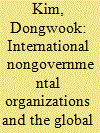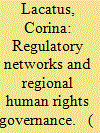| Srl | Item |
| 1 |
ID:
178675


|
|
|
|
|
| Summary/Abstract |
A wealth of literature argues that domestic institutions can sometimes restrain government repression. In this article, we highlight an institution tasked specifically with protecting and promoting human rights: the National Human Rights Institution (NHRI). Although common international standards exist, NHRIs exhibit substantial variation in their organization, the rights that they protect, the activities they permit, and the manner in which they appoint their members. Scholarship to date has conceptualized and measured NHRIs dichotomously; an NHRI either exists or it does not. We present data that highlights NHRI heterogeneity collected via content analysis of NHRI annual reports, NHRI websites, national constitutions, government legislation, and other sources. Using these data, we show NHRIs that can publish their findings and NHRIs that can punish offenders are each associated with less state torture. These data will allow future researchers to better explore important questions regarding NHRI origins, design, processes, and effectiveness.
|
|
|
|
|
|
|
|
|
|
|
|
|
|
|
|
| 2 |
ID:
123016


|
|
|
|
|
| Publication |
2013.
|
| Summary/Abstract |
During the past three decades national human rights institutions (NHRIs) have spread to more than one hundred United Nations (UN) member states and become key to human rights enforcement and democratic accountability. Given that NHRIs can take on a life of their own even under adverse conditions, why do governments in the developing world create permanent, independent national bodies with statutory powers to promote and protect human rights? Human rights international nongovernmental organizations (INGOs) are crucial for global diffusion. They empower local actors and influence governments in favor of NHRI adoption by mediating the human rights and NHRI discourses and mobilizing shame internationally. An event history analysis offers robust evidence that controlling for the UN, regional organizations, and other rival factors, human rights INGOs have systematic positive effects on diffusion. The case studies of South Korea and Malaysia provide process-tracing evidence that the hypothesized causal mechanisms are operative.
|
|
|
|
|
|
|
|
|
|
|
|
|
|
|
|
| 3 |
ID:
185159


|
|
|
|
|
| Summary/Abstract |
Transnational regional networks of regulatory bodies play a prominent role in complex systems of human rights governance. Despite their growing importance, we still have much to learn about the roles regional networks play as regulatory stewards in the field of human rights. I draw on the literature about regulatory stewardship to analyse a recently formalised regulatory network operating in Europe – the European Network of National Human Rights Institutions. The analysis proposes a model of global governance for human rights that includes networks of national human rights institutions as intermediaries. Moreover, it draws on some of the main concepts of network analysis to assesses the European network’s development into a ‘network administrative organisation’ and applies the model of regulatory stewardship to analyse the institutional network’s use of hierarchical and managerial stewardship to: support its member institutions; stimulate intra-network communication and learning; gain access to international networks; and to shape the regional human rights agenda.
|
|
|
|
|
|
|
|
|
|
|
|
|
|
|
|
| 4 |
ID:
114760


|
|
|
|
|
| Publication |
2012.
|
| Summary/Abstract |
There are many interpretations of the rule of law. Transforming from a 'thin' to 'thicker' conceptualisation means infusing 'quality' and 'goodness' to the laws of the State. Accordingly, this centres attention on aspects of adherence to international human rights, the focus of this article. Drawing on the literature linking rule of law with human rights, a preliminary evaluation of the extent to which Commonwealth States appear to respect this 'thicker' rule of law will be provided. Reference will be made to a qualitative analysis of the comments and recommendations made to States during the first cycle of universal periodic review by the UN Human Rights Council as well as a number of pre-existing statistical data on specific issues. While the rigour of such an approach may be queried, there can be little doubt that although there is evidence of rule of law compliance within the States, there remains scope for improvement.
|
|
|
|
|
|
|
|
|
|
|
|
|
|
|
|